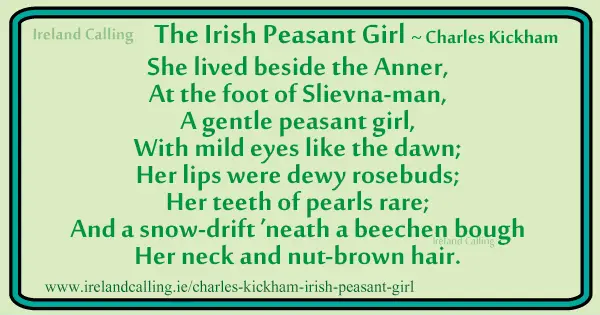may-top.html
Blood attempts to steal the British Crown Jewels
1671 Colonel Thomas Blood attempted to steal the British crown jewels from the Tower of London on this day in 1671.
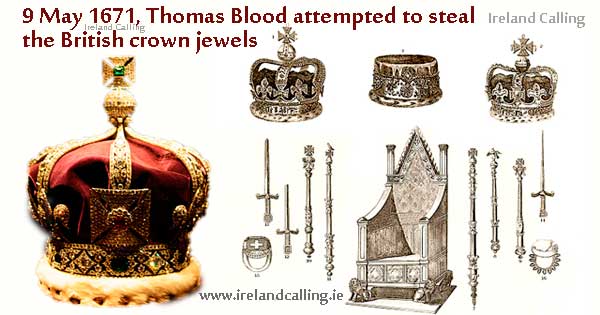
Blood was born in Ireland to an English landowner. He grew up to become an opportunist and a scoundrel. During the War of the Three Kingdoms, which was fought between England, Ireland and Scotland, Blood switched allegiances from King Charles to Oliver Cromwell when it suited him.
He also kidnapped and attempted to kill his arch enemy James Butler, 1st Duke of Ormonde. However, Ormonde escaped with the help of one of his servants, and a huge bounty was placed on the head of his attempted killers, although no-one knew it had been Blood.
Blood befriended custodians of Crown jewels
A short time later, Blood posed as a member of the nobility in order to gain access to the Edwards family who were the custodians of the crown jewels at the Tower of London. Blood visited them on several occasions and began making the arrangements for a marriage between his (fictitious) nephew and the Edwards’ daughter.
On one visit, he persuaded Edwards to let him see the jewels. Once inside the tower, Blood and his men beat and blindfolded Edwards and stole the jewels. However, they were intercepted by a member of the Edwards family who raised the alarm and Blood was arrested. After he was captured Blood allegedly cried: “It was a gallant attempt, however unsuccessful! It was for a crown!”
Blood would only answer to King Charles
He refused to answer to anyone but the king (nicknamed the merry monarch), and so received a personal hearing from King Charles. The king asked him: “What if I should give you your life?” to which Blood replied, “I would endeavour to deserve it, Sire!”
Apparently impressed and amused by Blood’s audacity, King Charles not only spared his life, but also granted him land in Ireland worth £500 a year.
Security was increased; the wooden bars around the Crown Jewels were replaced by iron bars, and visitors were no longer allowed to touch the Crown Jewels.
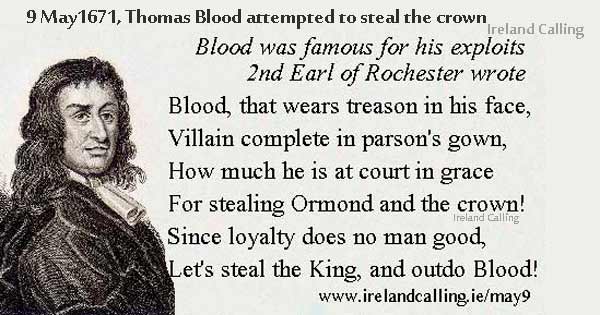
* * *
1828 Charles Kickham was born in Co Tipperary on this day in 1828. He was a member of the Irish Republican Brotherhood. He was a founder of the Irish People, a newspaper that rallied support for the Irish nationalists.
Kickham was a great speaker and played a role in the 1848 by inspiring the Irish people that they deserved better and could change their circumstances if they united together. Kickham was partially sighted and deaf (caused, in 1841, by an accident when a keg of gunpowder exploded – he was 13 years old. The accident damaged Kickham’s hearing and his eyesight) so he didn’t take part in the rebellion himself.
In 1865, the British authorities discovered plans for another uprising by the Irish Republican Brotherhood and arrested Kickham. He was sentenced to 14 years in prison, although the judge did reportedly admire Kickham and his intellect. Upon hearing his sentence, Kickham said:
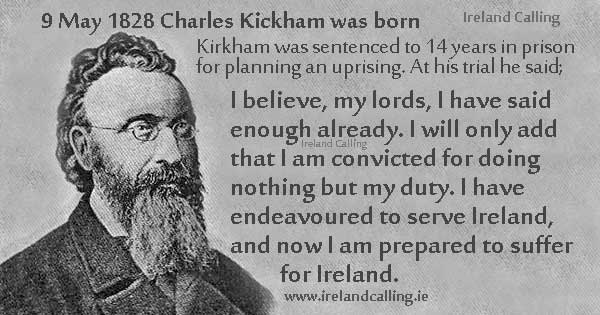
“Concessions to Ireland have always been the result of Fenianism in some shape or other. The English Government, however, while making concessions, always expected to get something in return. Not only have they stipulated upon getting prompt payment indeed, but they also contrive to get a large instalment in advance…English rule in Ireland is on its trial.
“The Government admit the existence of a widespread conspiracy, both in Ireland and America. This only shows that the treatment of Ireland by England has been judged and condemned. I regard alien government of this kind as a thing to be overthrown by the methods everywhere recognised as the most efficacious for such a holy purpose. This is my vindication, my justification for the attitude I have taken.
“I believe, my lords, I have said enough already. I will only add that I am convicted for doing nothing but my duty. I have endeavoured to serve Ireland, and now I am prepared to suffer for Ireland.”
As well as being a journalist, he was an accomplished writer of novels and poetry. He wrote one of his novels, Sally Cavanagh, while in prison. It was published on his release. He wrote about Irish life – the customs and the humour of the peasantry. His novels include “Knocknagow,” (also known as “The Homes of Tipperary”), “Sally Cavanagh” (about landlords and the affect of emigration) and “For the Old Land”.
Below is an extract of The Irish Peasant Girl. Read the full poem here.
1896 Austin Clarke was born on this day in 1896. He is considered as one of Ireland’s great poets and writers. He was notable for his use of Irish words and ideas, when writing in English.
He also worked as a journalist and co-founded the Irish Literary Theatre during his career. Two of Clarke’s poems, The Lost Heifer and The Blackbird of Derrycairn featured in the list of Ireland’s 100 favourite poems.
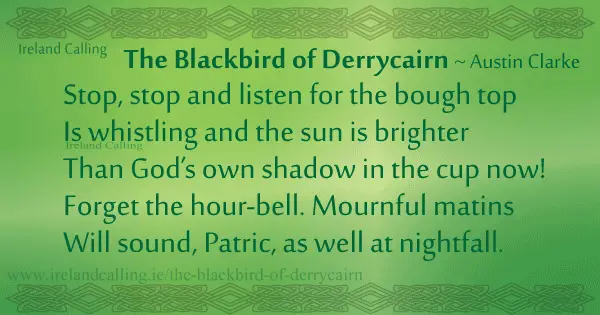
Click here to read Clarke’s poem, The Lost heifer
Click here to read Clarke’s poem, The Blackbird of Derrycairn
Click here to read about more Irish writers
* * *
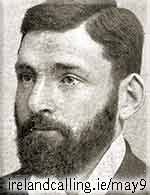 1916 Thomas Kent was executed by British officials on this day in 1916. He was a member of the Irish Volunteers and was involved in a gunfight with the Royal Irish Constabulary days after the Easter Rising.
1916 Thomas Kent was executed by British officials on this day in 1916. He was a member of the Irish Volunteers and was involved in a gunfight with the Royal Irish Constabulary days after the Easter Rising.
Kent and his brothers were from Cork and had been all set to take part in the Easter Rising. However, they received a message saying that the rebellion had been cancelled due to a lack of arms within the Irish nationalists. Due to a lack of communication the Rising did go ahead but only in Dublin.
After the British forces had retaken control of Dublin, they were ordered to arrest all known sympathisers with the rebels in the country, which included Kent and his brothers.
They resisted arrest and fought with the British military. David Kent was severely wounded and Richard was killed when trying to escape. The brothers had no choice but to surrender. Thomas and William were arrested and charged with armed rebellion. William was found not guilty but Thomas was sentenced to death and was executed by firing squad.
Click here to read more about the Easter Rising
* * *
1939 Mary, Lady Heath died on this day in 1939. She was a remarkable woman, who paved the way for women being accepted and respected in male dominated fields. She was born in County Limerick but moved to Newcastle West to be raised by her aunts because her father was declared insane after beating her mother to death.
Heath excelled in sports and after moving to London she co-founded the Women’s Amateur Athletic Association. She set records in the javelin and the high jump but it was when she learnt to fly that she really became famous.
Heath was the first woman to hold a pilot’s licence in Britain, and was also the first woman to parachute from a plane. She was the first person, male or female, to fly a small open-cockpit aircraft from Cape Town to London. She became a celebrity in the UK and Ireland and the American press referred to her as “Britain’s Lady Lindy”.
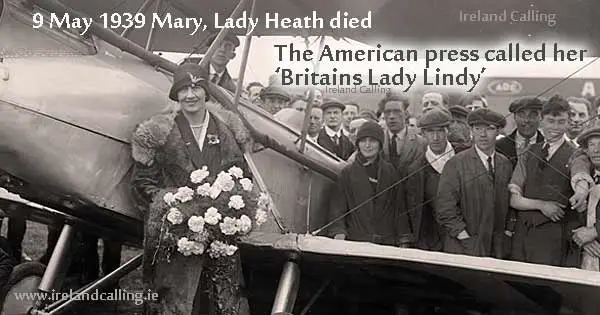
However, her aviation career was cut short was she was badly injured in a crash. She returned to Ireland and continued to fly but on a much smaller scale. She set up an aviation academy and many of the early Aer Lingus pilots were trained by Heath’s company.
* * *
1992 Linda Martin was named as winner of the 37th Eurovision Song Contest on this day in 1992. As Ireland’s representative, her song ‘Why Me?’ won 155 points be beat of fierce competition from the UK’s entry Michael Ball, whose song ‘One Step Out Of Time’ got 139 points.
It was the fourth time Ireland had won the competition, and began a new run of success with Ireland winning it for the next two years as well.
Click here to read more about Irish music
may-bottom.html
